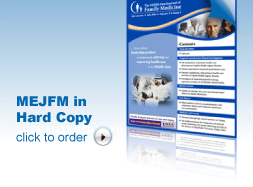|
|
 |
| ............................................................. |
|
|
| ........................................................ |
| From
the Editor |

|
Editorial
A. Abyad (Chief Editor)
DOI:10.5742/MEWFM.2019.93610
|
........................................................
|
|
Editorial
Dr.
Abdulrazak Abyad
DOI: 10.5742/MEWFM.2019.93623
Original Contribution
Self-monitoring
of Blood Glucose Among Type-2 Diabetic Patients:
An Analytical Cross-Sectional Study
[pdf]
Ahmed S. Alzahrani, Rishi K. Bharti, Hassan
M. Al-musa, Shweta Chaudhary
DOI: 10.5742/MEWFM.2019.93624
White
coat hypertension may actually be an acute phase
reactant in the body
[pdf]
Mehmet Rami Helvaci, Orhan Ayyildiz, Orhan Ekrem
Muftuoglu, Mehmet Gundogdu, Abdulrazak Abyad,
Lesley Pocock
DOI: 10.5742/MEWFM.2019.93625
Case Report
An
Unusual Persistent Mullerian Duct Syndrome in
a child in Abha city: A Case Report
[pdf]
Youssef Ali Mohamad Alqahtani, Abdulrazak Tamim
Abdulrazak, Hessa Gilban, Rasha Mirdad, Ashwaq
Y. Asiri, Rishi Kumar Bharti, Shweta Chaudhary
DOI: 10.5742/MEWFM.2019.93628
Population and Community
Studies
Prevalence
of abdominal obesity and its associated comorbid
condition in adult Yemeni people of Sana’a
City
[pdf]
Mohammed Ahmed Bamashmos
DOI: 10.5742/MEWFM.2019.93626
Smoking
may even cause irritable bowel syndrome
[pdf]
Mehmet Rami Helvaci, Guner Dede, Yasin Yildirim,
Semih Salaz, Abdulrazak Abyad, Lesley Pocock
DOI: 10.5742/MEWFM.2019.93629
Systematic
literature review on early onset dementia
[pdf]
Wendy Eskine
DOI: 10.5742/MEWFM.2019.93627
|
|
Chief
Editor -
Abdulrazak
Abyad
MD, MPH, MBA, AGSF, AFCHSE
.........................................................
Editorial
Office -
Abyad Medical Center & Middle East Longevity
Institute
Azmi Street, Abdo Center,
PO BOX 618
Tripoli, Lebanon
Phone: (961) 6-443684
Fax: (961) 6-443685
Email:
aabyad@cyberia.net.lb
.........................................................
Publisher
-
Lesley
Pocock
medi+WORLD International
AUSTRALIA
Email:
lesleypocock@mediworld.com.au
.........................................................
Editorial
Enquiries -
abyad@cyberia.net.lb
.........................................................
Advertising
Enquiries -
lesleypocock@mediworld.com.au
.........................................................
While all
efforts have been made to ensure the accuracy
of the information in this journal, opinions
expressed are those of the authors and do not
necessarily reflect the views of The Publishers,
Editor or the Editorial Board. The publishers,
Editor and Editorial Board cannot be held responsible
for errors or any consequences arising from
the use of information contained in this journal;
or the views and opinions expressed. Publication
of any advertisements does not constitute any
endorsement by the Publishers and Editors of
the product advertised.
The contents
of this journal are copyright. Apart from any
fair dealing for purposes of private study,
research, criticism or review, as permitted
under the Australian Copyright Act, no part
of this program may be reproduced without the
permission of the publisher.
|
|
|
| March 2019 - Volume
17, Issue 3 |
|
|
Validation of Audiovisual Educational
Tool that discusses psychological insulin barriers
for type 2 diabetic patients
Fahad Algahtani
Mazen Ferwana
Mohammad Alsaif
Faisal Alghamdi
College of Medicine, King Saud Bin Abdulaziz
University (KSAU-HS), Riyadh, Saudi Arabia
Correspondence:
Fahad Algahtani
College of Medicine, King Saud Bin Abdulaziz
University (KSAU-HS), Riyadh, Saudi Arabia
Tel: +966547599172
Email: algahtani023@outlook.sa
Received: November 2018; Accepted: December
2018; Published: January 1, 2019
Citation: Fahad Algahtani, Mazen Ferwana, Mohammad
Alsaif, Faisal Alghamdi. Validation of Audiovisual
Educational Tool that discusses psychological
insulin barriers for type 2 diabetic patients.
World Family Medicine. 2019; 17(1): 23-28.DOI:
10.5742MEWFM.2019.93595

|
Abstract
The
purpose of the study was to validate an
audiovisual tool created for the evaluation
of its usefulness in breaking the insulin
barrier, by making a video which is simple,
accessible and informative at the same
time. The video explains the nature of
type two diabetes, the progression of
the disease and the options for treatment
and their side effects. The video also
addresses the patients’ concerns
regarding insulin therapy and helps to
overcome the barriers towards starting
insulin therapy. The subjects included
178 staff personnel who met the inclusion
and exclusion criteria. The personnel
consisted of family medicine physicians
and residents, medical interns, nurses,
medical students and other medical staff
(including clinical pharmacist, dietitian,
and medical educator). The participants
were asked to fill out a validated questionnaire
which contained questions about the relevance,
clarity, completeness, reassurance, efficiency
and accuracy of the information in the
video. The study showed a positive response
by healthcare personnel toward the audio-visual
material which aimed to break insulin
barriers in diabetic patients. This material
can be used by the diabetic multidisciplinary
team as an educational tool as it will
leave the patient with a better understanding
of insulin which will lead to better control
of diabetes and increase compliance.
Key words: validation,
video, education, insulin resistance,
type 2 diabetic
|
|
|
.................................................................................................................

|
| |
 |

